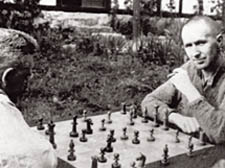|
|
 |
| |
 Benjamin and Brecht (right) playing chess Benjamin and Brecht (right) playing chess |
Scenes from a unique friendship
Eric Hobsbawm and John Gulliver on when Bertolt Brecht met Walter Benjamin
Walter Benjamin and Bertolt Brecht: the story of a friendship.
By Erdmut Wizisla.
Libris £23.99
HANNAH Arendt described the friendship between Brecht and Walter Benjamin as that between “the greatest living German poet and the most important critic of his time”.
That alone would make a book about their friendship essential reading for anyone interested in German literature in the 20th century. But more than this, it is both a guide to the intellectual Left in the Weimar Republic or in exile and to its relationship to Communism and the USSR.
Above all it takes us to the heart of an increasingly close relationship between two men of very different style and temperament that at first sight is surprising, and was indeed unwelcome to Benjamin’s politically less – or differently – committed friends. Both Gershom Scholem and the pillars of the Institute for Social Research saw Brecht’s possible influence on him as “dangerous”. And yet, as this book makes clear, it was vital to both.
Brecht wrote four poems about Benjamin’s death by suicide in France, bracketing his name with that of his lover Margarete Steffin, dead in Moscow. The last one begins: “Tactics of attrition are what you enjoyed/ sitting at the chess table in the pear tree’s shade.”
The picture of the two playing chess illustrates this invaluable work of scholarship, appreciation and the memory of great and terrible times.
Let us remember them as Brecht did, under the tree in exile.
ERIC HOBSBAWM
•
FRIENDSHIP between dazzling super intellectuals can be a little bit like some love affairs – one moment there’s affection, the next there’s doubt and even coldness.
This book traces the growing friendship between two significant intellectuals of the last century – Bertolt Brecht, dramatist and poet, and critic Walter Benjamin.
Brecht died in East Germany in the 1950s, essentially loyal to the ideals of Communism. He still captivates the public as a dramatist with his play Mother Courage, recently staged at the National Theatre, and with composer Kurt Weill, hit the charts with Mack the Knife.
Benjamin’s stature as a critic has grown in the past 30 years to the point where he is now high up on the reading list of any ambitious academic.
Tragically, he committed suicide in 1940 while escaping from the Nazis.
As intellectuals they were, in some ways, opposites. Brecht, an unorthodox Marxist who never played it by the book – and would upset communist loyalists. Benjamin, a great seeker after the truth, quoting Jewish thinkers who would look for 49 interpretations of every passage in the Torah!
At one level this dense book is almost off-putting with its detailed analysis of who thought and wrote what between the two of them.
But I am left with a sense of amazement at the unique richness of intellectual life in Germany in the 1920s and early 1930s– that is, before Hitler destroyed it. In what other country, then or now, could you compile a list of such towering intellectuals – Hannah Arendt, Thomas Mann, Heinrich Mann, Leon Feuchtwanger, Georg Lukacs, Paul Klee, Gershom Sholem, Theodor W Adorno, Heinrich Blücher, Hans Eisler, Kurt Weill, and, of course, Brecht and Benjamin?
At one point, even the actor Peter Lorre joined the fray of intellectual arguments.
And rumbling through the pages, there is forever the gathering shadow cast by the growing power of the far Right and anti-Semitic gangs.
Can lessons be drawn today from those times?
JOHN GULLIVER |
 |
|
|
 |
 |
|
 |
|
 Benjamin and Brecht (right) playing chess
Benjamin and Brecht (right) playing chess 
